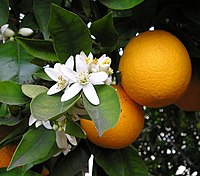
Photo from wikipedia
Brazil is one of the world’s largest producers of citrus. However, production is challenged due to biotic and abiotic factors limiting crop health. The aim of this work was to… Click to show full abstract
Brazil is one of the world’s largest producers of citrus. However, production is challenged due to biotic and abiotic factors limiting crop health. The aim of this work was to evaluate the influence of water deficit in sweet orange (Citrus sinensis) cv. Pera Bianchi inoculated with citrus tristeza virus (CTV). Two isolates of CTV were used, one causing severe symptoms (Forte Rolândia) and the second causing mild symptoms (Pêra IAC), grafted on Rangpur lime (Citrus limonia) and Swingle citrumelo [Citrus paradisi x Poncirus trifoliata], and the indicator sweet orange Pêra Bianchi, free of virus, and healthy controls containing only the indicator budwood. The water regime for the plants was field capacity or 50% field capacity. After five months of controlled irrigation, biochemical variables were measured (protein, proline content and catalase activity), and real-time RT-PCR amplification of the virus was performed for detection and quantification of viral titer. Differences were observed in the total protein content and proline, with greater accumulation in plants maintained under water deficit. There was no effect of drought on the population of viral isolates, but the plants held at field capacity and inoculated with the severe isolate had a higher viral titer.
Journal Title: Tropical Plant Pathology
Year Published: 2019
Link to full text (if available)
Share on Social Media: Sign Up to like & get
recommendations!